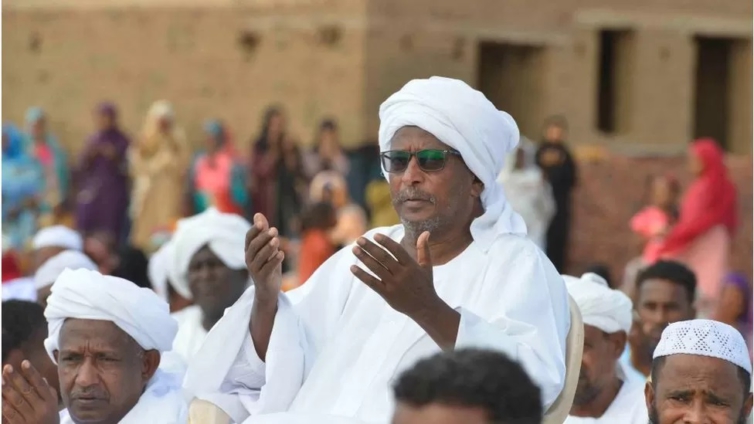Muslims in Sudan have been celebrating Eid al-Adha amid the sound of gunfire despite a ceasefire announced by the warring military groups.
Residents have told the BBC that heavy artillery and airstrikes were heard in Khartoum state.
"It doesn't feel like Eid," said Zahra Saeed, adding that the streets are "empty" and that people are "scared".
"Last night I couldn't sleep because of the sounds of the gunfire," Ms Saeed added.
Others say they are too afraid to even attend the outdoor prayers which are normally a central part of the day: "For the first time in my life I didn't go," said 22-year-old former medical student Walaa Ibrahim.
Instead, many people prayed in their own homes.
"Now the airstrike is being carried out, they don't respect people, they don't respect the importance of... such occasions," the ex-student added.
Sudan is currently in its 10th week of a war which started in April, amid a power struggle between the country's military and a paramilitary group called the Rapid Support Forces (RSF).
Since then, more than 500,000 people have fled Sudan, according to UN figures from just over a week ago, while roughly 2.2 million people have fled their homes within the country.
Precise figures on the number of people killed in the fighting are difficult to establish, but it is believed to be well over 1,000, including many civilians caught in the crossfire.
As well as the fighting, many Sudanese are also struggling to celebrate Eid properly because they don't have enough money.

As part of Eid al-Adha, Muslims who can afford to sacrifice a sheep or goat and share the meat between family, friends and the poor.
This is because Eid al-Adha, means "festival of sacrifice" and commemorates the time when, according to the Qur'an, the Prophet Ibrahim was ordered by Allah to sacrifice his son - and as he was about to do so, the boy was exchanged for a ram.
"Every Eid we used to buy a sacrificed sheep, but this Eid the situation is quite difficult because of war and because most of us did not get paid. We cannot pay for sacrifice sheep due to the high prices," said Mohammed Abboud Soliman, a cattle trader from West Kordofan state.

The usual sweet Eid treats from bakeries are also in short supply. In Omdurman, one of three cities that make up Greater Khartoum, bakeries have been looted.
One resident told the BBC: "Two bakeries have been exposed to robbery and unfortunately one of the bakers was killed. These two bakeries were very important as their production was fulfilling the need of a large area.
"Houses are daily subject to looting and robbery. The situation is deteriorating."
Latest Stories
-
Tesla executives questioned Musk after he denied killing $25,000 EV project, sources say
57 minutes -
Oreo maker sues Aldi in US over ‘copycat’ packaging
1 hour -
US steel and aluminium tariffs doubled to 50%
1 hour -
Ghana’s legal education debate: Are we expecting too much too soon?
2 hours -
Alcaraz storms through to semi-final with Musetti
2 hours -
Black Queens wrap up Abidjan training tour with defeat to Côte d’Ivoire
2 hours -
Inzaghi leaves Inter Milan ‘by mutual agreement’
2 hours -
‘Man Utd didn’t need the money’ – Fernandes rejects Al-Hilal move
2 hours -
Cybercrime ringleader, 10 others remanded in custody
2 hours -
Gov’t to expand student loans to all tertiary institutions – Education Minister
2 hours -
WaterAid Ghana, Guinness Ghana commission water project in Upper West Region
2 hours -
Energy levy: ‘You can’t continue pouring water into a leaking bucket’ – COPEC warns
2 hours -
Rising Star: Yvonne Dadson’s groundbreaking research earns international recognition
2 hours -
Suicide bomber killed in Uganda on Christian holy day, army says
3 hours -
Journalists urged to champion nutrition and public health advocacy
3 hours

